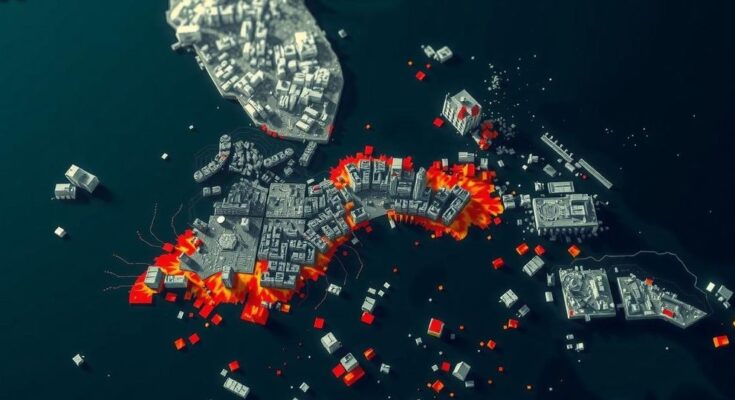Cuba faces another islandwide power outage following Hurricane Rafael, which struck with devastating winds, marking the second such incident in two weeks. The storm severely affected agriculture and infrastructure, leading to desperation among the populace who struggle with food preservation without electricity. The government mobilizes military aid, yet a prevailing sense of uncertainty looms over the reliability of recovery efforts.
The island of Cuba experienced a widespread power outage following the devastation caused by Hurricane Rafael, which struck the western regions with damaging winds. This marks the second occurrence of a complete power failure within just a fortnight. The storm, classified as a Category 3 hurricane, resulted in severe damage to agricultural areas, infrastructure, and homes, leading to significant challenges for the population of approximately ten million residents. The United States National Hurricane Center (NHC) reported that Hurricane Rafael brought sustained winds of up to 185 km/h (115 mph), prompting concerns about life-threatening conditions including storm surges and flash floods. As the hurricane navigated west of Havana, it directly impacted the tobacco-growing provinces of Artemisa and Pinar del Rio, where farmers had previously taken measures to safeguard their yield of tobacco and crops. However, the post-storm situation left many residents in dire straits, particularly in terms of food preservation due to the loss of electricity. In Havana, the streets were deserted as businesses and schools remained closed while transport services gradually resumed. The government mobilized military resources to assist in disaster response efforts, with President Miguel Diaz-Canel assuring the populace of the commitment to recovery. Despite these measures, a palpable sense of despair pervaded as residents expressed doubts regarding the government’s ability to effectively manage the recovery and restore essential services, exacerbated by the country’s strained economic conditions. Cuban citizens, such as Marta Leon Castro and Giovanny Fardales, voiced their personal tragedies and fears in light of the storm’s aftermath, reflecting widespread anxiety and frustration regarding their living conditions. This hurricane season has seen a higher-than-normal frequency of storms, raising concerns over future weather events as forecasts predict an even more active season for 2024. The devastation caused by Hurricane Rafael underscores the vulnerabilities of Cuba’s infrastructure and the dire need for extensive support in the face of natural disasters affecting its agricultural and economic stability.
Hurricane Rafael’s impact on Cuba follows recent challenges posed by extreme weather and aging infrastructure. The island’s susceptibility to hurricanes is heightened due to a combination of geographic positioning and deteriorating public services, which have been exacerbated by economic constraints. The recent trend of increased hurricane activity in the Atlantic, including Rafael being the 17th named storm of the current season, compounds the challenges faced by the island, which has struggled to recover from previous storms like Hurricane Oscar. These conditions necessitate discussions on disaster preparedness and the resilience of Cuba’s infrastructure in the wake of prolonged economic difficulties and limited resources.
In conclusion, the aftermath of Hurricane Rafael serves as a stark reminder of Cuba’s vulnerability to natural disasters, particularly in the context of its economic and infrastructural challenges. The widespread power outage and the associated human toll highlight the urgent need for improved disaster recovery capabilities and enhanced support systems. As the country confronts the implications of a busy hurricane season, it is imperative for authorities to strategize and reinforce measures aimed at safeguarding the well-being of its citizens amid increasing environmental threats.
Original Source: www.aljazeera.com




